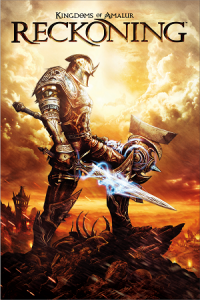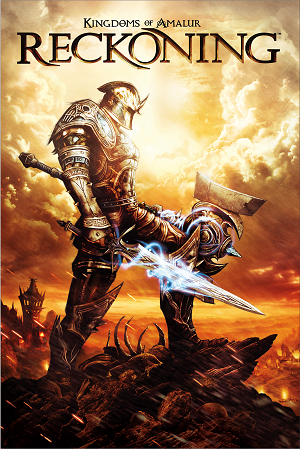
If you’re not much of a follower of gaming news, you might’ve missed that Kingdoms of Amalur: Reckoning sold roughly 330,000 copies in parts of the North American market in February, according to Joystiq.
This puts the game by Curt Schilling’s 38 Studios as #4 among all games sold last month. At a $59.99 price tag, that’s a hefty amount, though not stunning by some recent standards. It does, however, make KoA:R the only game put out by a new studio to break the top 10 for February. However, there’s a bit of a silver lining; the 330,000 number doesn’t cover the entirety of the North American market, nor any other markets in the world. So expect total worldwide sales to be larger. No doubt Rhode Island will be watching with bated breath.
I’m actually a follower of gaming, though I’ve never been a hardcore gamer (I grew up without a video game system, our hand-me-down PC was always hopelessly outdated along with our games, and now I own an aged Mac). So while it’s good that KoA:R was able to sell this well (especially in the wake of Elder Scrolls V: Skyrim), I’m hesitant when it comes to 38 Studios’ shadowy “Project Copernicus” massively multiplayer online game (MMO). Perhaps it’s my view that the MMO market is less open to innovation than other genres.
See, one of the things that KoA:R had going for it was that it’s single-player. Single-player games are like novels, in a lot of ways (KoA:R even had an established author writing for it). People are more willing to get into a new one. But MMOs are in a lot of ways like a bowling league. Once you’re part of one, why join another?
This is partly what’s allowed World of Warcraft to persist for so long; still with 10.2 million users seven years after its release and with a fourth expansion to be released. You see, players get invested in the world because all their friends are there; like in a bowling league. To give a tech analogy; WoW is Facebook. Its competitors are Friendster, MySpace, and Google+. If you want to succeed, you have to do something different; like Twitter.
I assume that 38 Studios knows this and understands the risks. But I also assume that the General Assembly had next to no idea when they authorized their $75 million grant; I’ll assume they were motivated by WoW’s profit margins without considering what makes WoW WoW. If 38 Studios can get Project Copernicus to succeed, then none of that will matter.
One of the great things about the gaming industry is that it’s highly decentralized. Unlike the publishing industry in New York or the film industry in Los Angeles, gaming studios can exist almost anywhere. This is largely due to the nature of their technology, which allows studios to be anywhere. But 38 Studios may represent the tail end of a dying business model: hard copy gaming. Game sales were down 20% in February from the year before. Hopefully, 38 Studios will be able to pivot away. The gaming industry is entering uncharted territory.
But independent studios are pointing the way. The success of Minecraft demonstrated that a single person working a relatively unique concept could make millions (full disclosure: I bought Minecraft in its alpha phase of development for about $10, I’d played it before when it was a relatively simplistic browser-based game). The thirst for innovation is there. With 5.75 million sales between its PC and smartphone editions, Minecraft probably represents a far greater return on its investment than WoW. Rhode Island might consider fostering independent studios to develop innovative games. At the very least, 38 Studios shouldn’t gamble all of its money on a couple of blockbuster titles; it too should invest a little in a few developers to come up with interesting games. The studio Valve, which created the gaming masterpieces of the Half-Life series launched the even more critically acclaimed Portal series after finding it as a student project.
The gaming industry is in the midst of great changes. Does 38 Studios have the ability to navigate them?






